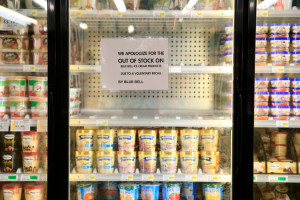I don’t know what gets CEOs, COOs, CFOs attention when it comes to food safety. Whom reports to whom appears to matter when it comes to the values that support a good food safety culture.
Some of the industry food safety folks I interact with say they have a direct line to the decision-makers and work together to nimbly react to food safety issues. Others say that the powers-that-be don’t understand the science, risk assessment and consequences. And won’t do much until there’s a crisis.
Paraphrasing one of the food safety nerds who has power:
I’ve convinced the CEO that finding listeria ourselves is a good thing because we can get to the source; that’s changed the culture of QA folks in the plants. We look, find and fix. And there’s money to support it.
That’s good.
Other food safety folks report that they have to put more money into hairnets, reducing their budget food handwashing tools because the COO thinks orphan hairs is the most unhygienic thing. Risk factor vs. yuck factor at its best.
I’m increasingly cynical that the above is unique and most don’t study the litany of outbreaks and learn from them. Many execs don’t see their companies as the next Blue Bell, and as Powell says, believe their own press releases.
Diana Wray of the Houston Press summarizes Blue Bell’s last year as part of coverage of a U.S. Department of Justice criminal investigation.
For a second there it seemed like Blue Bell was really going to put the whole listeria outbreak behind it. Ever since Blue Bell restarted production back in August, both the officials running the “little creamery in Brenham” and the public have treated the return of Blue Bell ice cream to grocery store shelves as a grand rebirth for the company. It was almost as if the whole listeria thing had never happened.
Almost.
Blue Bell may still be in the midst of a comeback tour, but the company is now facing a U.S. Department of Justice investigation over the listeria outbreak earlier this year that forced the company to recall all of its products and almost sent Blue Bell over the financial edge.
According to a CBS News report, the Justice Department is trying to figure out what Blue Bell management knew about the potentially deadly hazards in their plants and when they knew it.
Still, the company was circling the drain until Fort Worth oil man Sid Bass stepped in with an injection of $125 million this summer in exchange for a one-third stake in the company. And for a little while, despite the OSHA reports of worker injuries and the allegations of unsanitary conditions that reportedly left Blue Bell’s factories incredibly vulnerable to contamination, it looked like Blue Bell was going bounce right back. In fact it seemed likely that the company would simply hire back some of the workers that had been laid off, restart the factories and go back to putting ice cream on the shelves without any real consequences.
Sure there was a federal lawsuit filed by David Shockley, a man who was working at an elderly care center in Houston and regularly eating the ice cream when he became ill with what was determined to be listeria meningitis in October 2013. And of course Blue Bell had been forced to furlough 1,400 employees and lay off about 1,450 from it’s 3,900-person workforce. But despite all of that, the public has been remarkably forgiving, all three factories are now up and running and Blue Bell products are slated to be back on shelves in 15 states by the end of January.
So far neither the feds nor Blue Bell have confirmed or denied the investigation into the company. However, considering who’s spearheading the investigation, Blue Bell management could be facing some pretty serious allegations.
